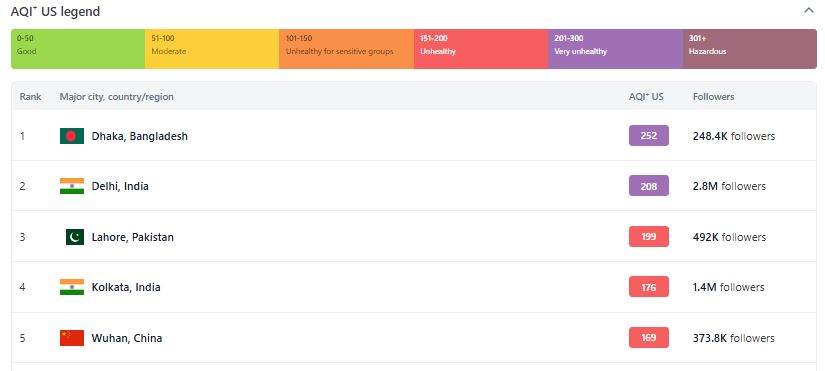Md Hasanur Rahman Tanzir – Dhaka’s air is becoming increasingly polluted. Especially with the arrival of winter, the air quality becomes even more dangerous. At the beginning of winter this year, the air quality was very unhealthy for several consecutive days. As a result, Dhaka’s air is still in a ‘very unhealthy’ condition this morning.
International air quality technology company IQAir released the air pollution list at around 9 am on Friday (December 13).
At the same time, the capital Dhaka is at the top of the list of the most polluted cities in the world with a score of 252. This air quality is also considered ‘very unhealthy’ for citizens. In this situation, children, the elderly and sick patients are advised to stay indoors and others are advised to limit their outdoor activities.
In addition, the Indian city Delhi is in second place with a score of 204. This air quality is also considered ‘very unhealthy’ for citizens. In this situation, children, the elderly and sick patients are advised to stay indoors and others are advised to limit their outdoor activities.
Meanwhile, the Pakistani city Lahore is in third place with a score of 199. This air quality is also considered ‘unhealthy’ for citizens.

It is worth noting that IQAir is a Switzerland-based air quality monitoring technology company. They regularly publish a list of cities with polluted air in the world. The company creates this AQI index based on air quality, which informs and warns people about how clean or polluted the air in a particular city is.
IQAir scores from zero to 50 are considered good. 51 to 100 are considered moderate, and 101 to 150 are considered unhealthy for sensitive groups. If the score is 151 to 200, it is considered ‘unhealthy’ air. An AQI score between 201 and 300 is called ‘very unhealthy’. In this situation, children, the elderly and sick patients are advised to stay indoors and others are advised to limit their outdoor activities.
In addition, IQAir between 301 and 400 is considered ‘hazardous’, which poses a serious health risk to city residents. AQI is usually determined based on five types of pollution. For example, particulate matter (PM10 and PM2.5), NO2, CO, SO2 and ozone (O3). Air pollution poses serious health risks. It is harmful to people of all ages. However, air pollution is very harmful to children, the sick, the elderly and pregnant women.




















